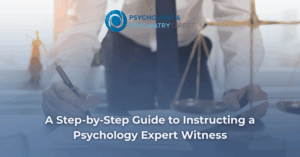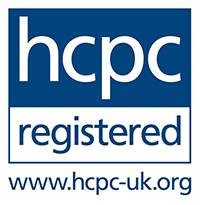A Step-by-Step Guide to Instructing a Psychology Expert Witness
For solicitors and legal professionals, the decision to instruct an expert witness is often pivotal to the success of a case. However, the process of engaging a psychology expert witness can seem complex, particularly with the need for precision, compliance, and efficiency.
At Psychology Direct, we understand that time is of the essence and that finding the right qualified professional, supported by seamless administration, is a top priority. We aim to provide not just highly vetted experts, but also a streamlined, proactive service that supports you every step of the way.
This guide breaks down the process of instructing a psychology expert witness into clear, manageable steps, highlighting how Psychology Direct ensures a smooth and effective experience for legal teams.
Step 1: Initial Case Discussion & Identifying the Need
Before formally instructing an expert, it’s crucial to clearly define the specific psychological questions relevant to your case. This initial stage involves:
- Identify the core issues, such as what specific psychological insights are required? Is it about mental capacity, parental capacity, the impact of trauma, an assessment of a particular condition (e.g., ADHD, PTSD), or risk assessment?
- Determine the legal context, is it for family law, criminal law, personal injury, or civil litigation? This influences the type of expert and the report’s focus. For a detailed breakdown of which expert might be suitable, see our guide on Psychologist vs. Psychiatrist for an Expert Witness Report.
- Considering the urgency, are there court deadlines or critical timeframes?
Our dedicated team is available for an initial discussion to help you clarify these points. We listen to your needs, offer insights into the type of psychological expertise best suited for your case, and advise on initial considerations, often before a formal instruction.
Step 2: Preparing the Letter of Instruction (LOI)
The Letter of Instruction is the cornerstone of the expert’s engagement. It sets out the scope of work, the questions the expert is asked to address, and the materials they should consider. A well-drafted LOI is essential for clarity and ensuring the expert’s report is admissible and relevant.
A comprehensive LOI should typically include:
- Details of the parties involved.
- The legal context and relevant court orders.
- The specific questions or issues the expert is required to address.
- A list of all documents provided for the expert’s consideration.
- Relevant deadlines.
- Confirmation of the expert’s duty to the court (CPR Part 35 or FPR Part 25).
- Details of fees and payment terms.
Step 3: Expert Assignment & Document Review
Once the LOI is approved, the next step is to assign the most appropriate expert and allow them to review the provided documentation.
- The right expert possesses not only the psychological knowledge but also specific experience in the relevant legal domain.
- The expert meticulously reviews all disclosed documents to build a comprehensive understanding of the case background.
Step 4: Assessment & Information Gathering
This phase involves the expert conducting their assessment, which may include:
- Direct interviews with the subject of the report (e.g., claimant, defendant, parent, child).
- Collateral interviews with other relevant parties (e.g., family members, teachers, care providers), with appropriate consents.
- Administering standardised assessments where appropriate to gather objective data on cognitive function, personality, or specific disorders.
- Observation, in some cases it involves observing interactions (e.g., parent-child).
Step 5: Report Drafting & Review
This is where the expert synthesises all the gathered information into a comprehensive, impartial, and court-ready report.
- The report must be clear, concise, objective, and presented in a way that is easily understood by non-specialists (i.e., the court and the jury).
- Adherence to the Civil Procedure Rules (CPR Part 35) or Family Procedure Rules (FPR Part 25) is paramount, including the expert’s duty to the court.
- The report must directly answer the questions posed in the Letter of Instruction.
Step 6: Beyond the Report (Conferences, Clarifications, Court Attendance)
After the report is submitted, further steps may be required:
- Providing further explanation on points within the report.
- A joint statement/conference of experts, where multiple experts are instructed, they may confer to identify points of agreement and disagreement.
- The expert may be required to give oral evidence in court.
Partner with Psychology Direct for a Seamless Process
Instructing a psychology expert witness doesn’t have to be a source of stress. With Psychology Direct, you benefit from not just highly qualified, vetted professionals but also a fully managed service that takes the administrative burden off your shoulders. We are dedicated to providing efficiency, proactivity, professionalism, and understanding, ensuring you get the right expert and the right report, on time, every time.
Ready to instruct an expert? Our streamlined process makes it simple. Get in touch with Psychology Direct today to discuss your case and discover our efficient, expert-led service. Call us directly on 01306 879 975 or complete our online contact form.
Did you know that we also offer Psychiatric services?
Our fully vetted Psychiatrists are qualified and Section 12 approved to provide detailed, medically-based analysis and assessment of a person’s state of mind or mental health.





